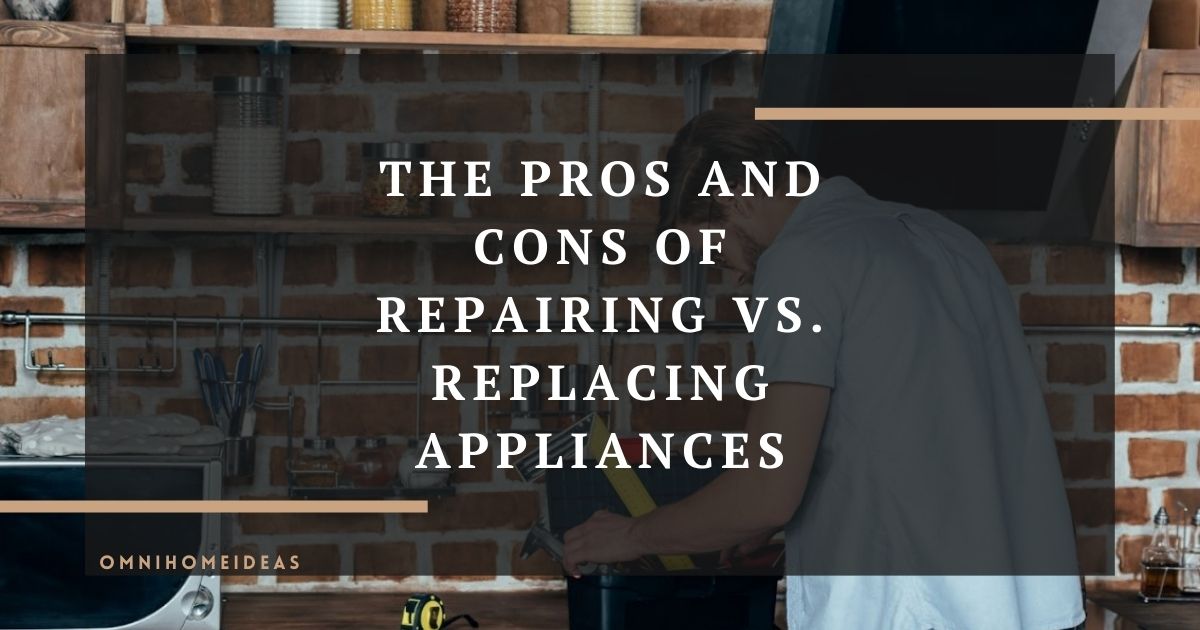When faced with a malfunctioning appliance, the dilemma of whether to repair or replace it can be challenging. Each option has its advantages and drawbacks, and the right decision depends on various factors, including cost, convenience, environmental impact, and the specific situation at hand. This article explores the key considerations to help you make an informed choice.

1. Cost Analysis: Upfront vs. Long-term Expenses
Repair Costs
Repairing an appliance often seems like the cheaper option in the short term. The immediate expense usually involves labor costs and the price of any necessary parts. For minor issues, this can be a cost-effective solution. For example, fixing a broken belt in a dryer or replacing a faulty thermostat in a refrigerator can extend the appliance’s life without breaking the bank.
Replacement Costs
Replacing an appliance involves a significant upfront cost. However, new appliances come with warranties and the latest energy-efficient technologies, which can result in lower operating costs over time. If an older appliance has frequent issues, the cumulative repair costs might exceed the cost of a new one.
Hidden Costs
Consider hidden costs such as the potential need for modifications to accommodate a new appliance, disposal fees for the old unit, and the time required for installation. These can add to the overall expense of replacing an appliance.
2. Environmental Impact: Sustainability Considerations
Repairing Appliances
Repairing appliances is generally more environmentally friendly. It reduces waste by extending the lifespan of existing items and minimizing the demand for new raw materials and manufacturing processes. This approach aligns with sustainable practices and reduces the burden on landfills. When making this decision, the only necessity is to have supplies to repair your appliances on hand, in addition to knowing how to carry out the repairs.
Replacing Appliances
New appliances are often more energy-efficient, which can lead to lower utility bills and a reduced carbon footprint over time. However, the manufacturing process and disposal of old appliances have environmental costs. If the new appliance significantly reduces energy or water usage, it might offset these initial environmental impacts.
Recycling Old Appliances
When replacing an appliance, ensure it is recycled properly. Many parts and materials can be reused, reducing the environmental impact. Some manufacturers and retailers offer take-back programs to handle the recycling of old appliances responsibly.
3. Performance and Efficiency: Assessing Longevity and Technology
Performance of Repaired Appliances
A well-repaired appliance can function almost as efficiently as a new one, especially if the repair addresses critical issues. However, older appliances may lack modern features and efficiencies that new models offer.
Efficiency of New Appliances
New appliances typically offer improved energy efficiency, better performance, and advanced features such as smart home compatibility and enhanced safety mechanisms. These improvements can provide long-term savings and convenience, making a strong case for replacement in certain scenarios.
Technological Advances
Newer appliances often incorporate the latest technological advancements, which can significantly enhance user experience. Features such as smart controls, enhanced safety features, and better ergonomics can make a new appliance more appealing.
4. Reliability and Convenience: Downtime and Hassle

Downtime with Repairs
Repairing an appliance can lead to periods of downtime, depending on the availability of parts and the scheduling of service technicians. This inconvenience can be manageable for some, but for essential appliances, extended downtime can be disruptive.
Convenience of Replacement
Replacing an appliance typically involves a shorter period of inconvenience. Once the new unit is installed, it should operate without issues, covered by a warranty. However, the initial setup and adjustment period should be considered.
Availability of Parts and Expertise
For older or uncommon appliances, finding the right parts and a skilled technician can be challenging. This scarcity can lead to longer repair times and higher costs. In such cases, replacing the appliance might be a more practical solution.
5. Value and Depreciation: Investment Perspective
Depreciation of Appliances
All appliances depreciate over time, meaning their value decreases as they age. This depreciation affects the decision to repair or replace, especially for older units nearing the end of their expected lifespan. It might not be worth investing in repairs for an appliance with limited remaining useful life.
Resale and Trade-in Value
Newer appliances generally have higher resale or trade-in value. If you plan to upgrade, consider the potential return on selling your old appliance. Some stores offer trade-in programs that provide discounts on new purchases, which can offset the cost of replacement.
Long-term Value
Investing in a high-quality, durable appliance can provide long-term value. While the initial cost might be higher, the reliability and efficiency of a well-made appliance can result in lower total costs over its lifespan compared to frequently repairing cheaper models.
Conclusion on Repairing vs. Replacing Appliances
Deciding between repairing or replacing an appliance involves weighing several factors, including cost, environmental impact, performance, reliability, and long-term value. Each situation is unique, and the right choice depends on the specific circumstances and priorities of the appliance owner. By carefully considering these aspects, you can make a well-informed decision that aligns with your financial, environmental, and practical needs.

